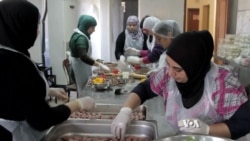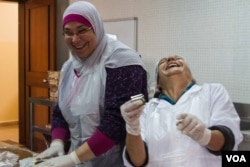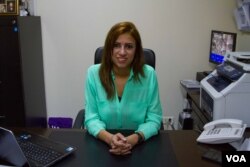They are the laughing chefs whose cookery is fueling hopes that common ground can be found among the residents of one of Lebanon’s most dangerous and divided neighborhoods.
In the country’s second biggest city of Tripoli, a love of food is bringing together women from the communities of Bab Al-Tebbeneh, home to a majority Muslim Sunni community, and Jabal Mohsen, which has a largely Alawite population.
Those communities, divided by a single street, have been devastated by decades of conflict. Those tensions have been further inflamed by the Syrian civil war and the actions of Syria's Alawite president, Bashar al-Assad.
Clashes in October between the Lebanese Army and gunmen in Bab Al-Tebbeneh caused thousands of residents to flee. Islamist militants took part in the fighting, feeding fears that the the extremist group Islamic State was seeking a foothold in Lebanon.
Working together
Women from the two communities have been learning to work together in recent months, however, encouraged by a non-profit organization named Ruwwad Al Tanmeya Lebanon. In the process, they are earning enough money to feed their families.
Hana Mawad is a Bab Al-Tebbeneh resident who has suffered as years of shelling destroyed her home and deafened her husband. She described the first meeting with the women from Jabal Mohsen.
“Each person was sitting by herself," said the mother of seven. "We were looking at each other, thinking, ‘She’s from there, and I’m from here.’ Then after the second or third sessions, we tried to get closer. We tried to get more involved. And I really tried to get into it. Now when we meet, we close the door so people outside don’t hear how happy we are.”
New skills
Seven months ago, chefs from a Lebanese social enterprise named Souk el Tayeb began teaching the women new cooking skills, including such traditional dishes as samke harra -- fish stuffed with pine nuts, coriander and chili sauce -- and ma'amoul cookies.
The official launch of the cooking project has been delayed by continuing friction in Tripoli, but 13 of the newly trained chefs already are earning a living by selling food to organizations including the Red Cross. They expect to begin selling a range of preserves in the near future.
Sarah Al-Charif is the executive director of Ruwwad Al Tanmeya, which is based in the heart of the neighborhood. The non-profit has endured 11 rounds of conflict between the communities since launching two years ago at its current location.
Al-Charif said her group set out to use the women’s cooking skills to empower them and give them a common cause.
“When you empower women, you are empowering the whole family,” she said. “This will mean they can secure their own food and education without the need to knock on doors asking for financial assistance.”
'Conflict resolution'
Food has great potential to offer “an indirect way of doing conflict resolution,” added Kamal Mouzawak, founder of another organization called Souk el Tayeb which promotes small scale farmers and producers.
“Food is an easy language, which is related to people’s histories and traditions," said Mouzawak. "It can be difficult for two people to discuss their politics, but bring them together over food and they may put aside their differences and see what they can share.”
For Mawad, who told VOA it is hard to find work even in times of peace, making friends from a different community has been important. Equally important, though, has been the project's impact on how she sees herself.
"I’m really happy," she said. "I can do something that changes me for the better. I wasn’t just sitting there, having given up. It is a big step that I have taken."












